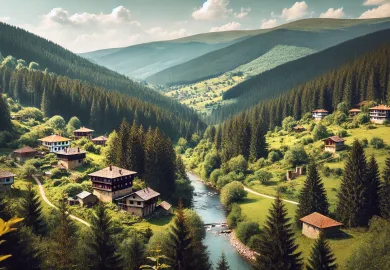
Disclaimer: This content was generated using AI. While I strive for accuracy, I encourage readers to verify important information. I use AI-generated content to increase efficiencies and to provide certain insights, but it may not reflect human expertise or opinions.
Grenada, often referred to as the Spice Isle, is more than just pristine beaches and aromatic nutmeg plantations. It is a treasure trove of historical gems, each whispering tales of its vibrant past. From colonial-era forts to ancient artifacts, Grenada offers a unique blend of culture, history, and breathtaking landscapes.
Embark on this journey through Grenada’s finest historical locations, immersing yourself in the stories of its resilient people, strategic significance, and cultural evolution. Here’s a curated guide to the must-visit historical sites that will leave you in awe of this Caribbean paradise.
The Iconic Fort George: A Glimpse into Grenada’s Colonial Era
Perched majestically above the capital, St. George’s, Fort George stands as a testament to Grenada’s tumultuous colonial history. Built by the French in 1705, this fort was a crucial military stronghold and offers sweeping views of the harbor and beyond.
Walking through the fort’s stone corridors, you’ll discover a wealth of history, from French architectural influences to British military expansions. The fort also witnessed the tragic events of 1983 during Grenada’s political upheaval, marking it as a site of national significance.
Besides its historical relevance, Fort George offers one of the best vantage points to capture picturesque views of St. George’s. The vibrant hues of the town’s colonial-era buildings contrast beautifully with the azure waters of the harbor, making it a favorite spot for photographers.
Wear comfortable walking shoes as the terrain can be uneven, and don’t forget your camera to capture the stunning vistas. Guided tours are available, providing deeper insights into the fort’s history and the battles it endured.
Belmont Estate: Grenada’s Agricultural Heritage Comes to Life
Located in the heart of Grenada’s lush countryside, Belmont Estate is a beautifully preserved 17th-century plantation that offers a fascinating look into the island’s agricultural history and colonial past.
Belmont Estate was initially established for sugarcane production but transitioned to cocoa farming, a crop that remains integral to Grenada’s economy today. Guided tours take you through the traditional processes of cocoa production, from bean to bar, providing a hands-on experience of this age-old craft.
The estate also houses a museum showcasing artifacts from Grenada’s colonial and pre-colonial eras. Traditional Grenadian cuisine, served at the estate’s restaurant, gives visitors a taste of the island’s rich culinary heritage.
Perfect for families, Belmont Estate offers interactive activities like cocoa grinding and chocolate-making workshops. Kids and adults alike can enjoy learning about sustainable farming practices while soaking in the scenic countryside.
The Carriacou Museum: Preserving Indigenous and Colonial History
Nestled on Grenada’s sister island, Carriacou, the Carriacou Museum is a small yet impressive institution dedicated to preserving the island’s heritage, including its indigenous Amerindian roots.
The museum displays a collection of artifacts from the Amerindian people, including pottery and tools. These items provide valuable insights into the lives of the island’s first settlers and their connection to the land.
In addition to indigenous history, the museum houses exhibits highlighting Carriacou’s colonial past under both French and British rule. Documents, maps, and personal belongings from the colonial era help paint a vivid picture of life during this time.
Located in Hillsborough, the museum is easy to access and offers a quiet retreat for history enthusiasts. Combine your visit with a walk along the nearby beaches to experience the island’s natural beauty.
St. Andrew’s Anglican Church: A Spiritual Landmark with Historic Charm
Situated in Grenville, St. Andrew’s Anglican Church is one of Grenada’s oldest religious buildings. Built in the early 19th century, this church is a beacon of spiritual and historical significance.
The church’s stone architecture reflects the design styles of the era, with intricate woodwork and stained glass windows that have survived the test of time. Although damaged by hurricanes over the years, restoration efforts have preserved its original charm.
St. Andrew’s Anglican Church has long been a focal point for the local community, hosting services and cultural events that bring Grenadians together. Visiting the church during a service offers a unique glimpse into the island’s spiritual life.
The churchyard, shaded by ancient trees, is a serene spot for reflection. It’s also a photographer’s delight, with its rustic charm and scenic backdrop of the surrounding countryside.
Explore Grenada’s Hidden Historical Treasures
Grenada is a paradise for history lovers, offering a mix of colonial landmarks, agricultural heritage, and indigenous culture. Beyond its well-known tourist spots, the island’s smaller villages and natural landscapes often hide untold stories waiting to be discovered. Whether you’re exploring forts, plantations, or museums, Grenada’s history will captivate your imagination and deepen your appreciation for this vibrant Caribbean island.








